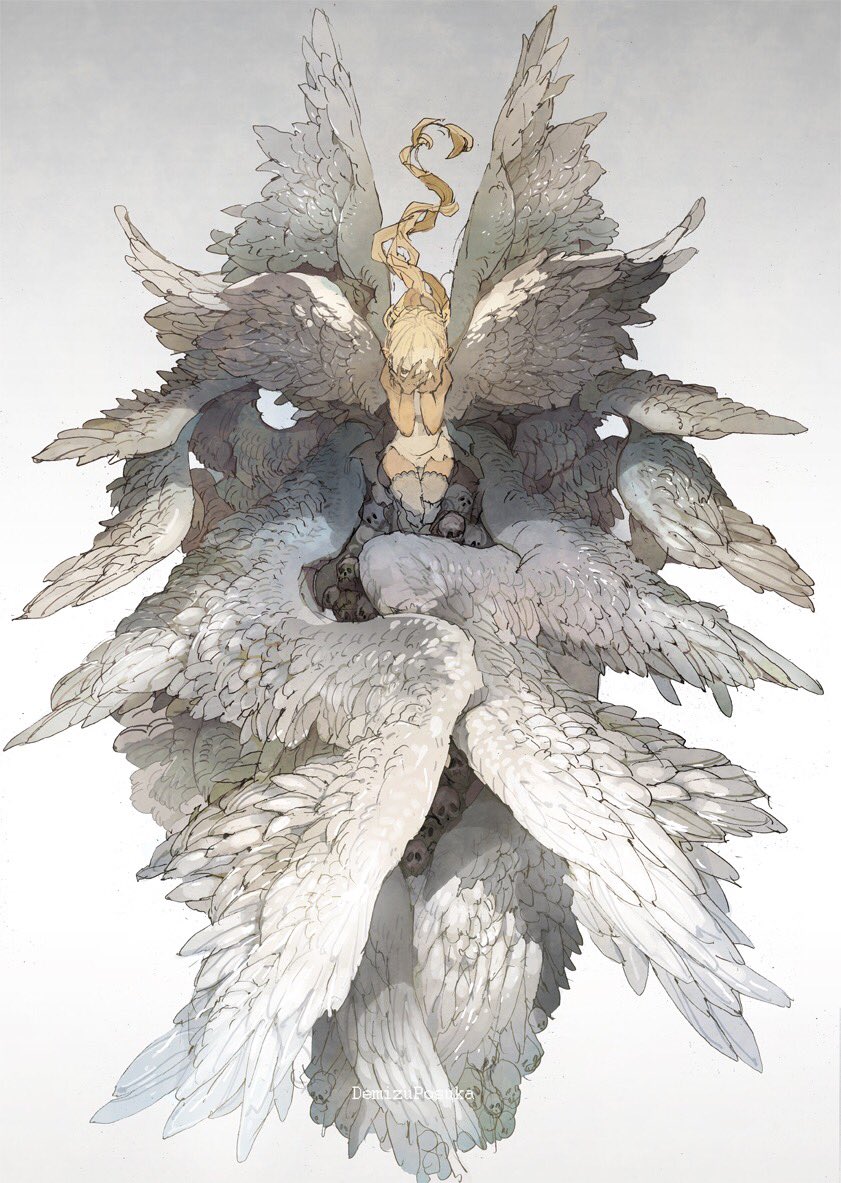


Angel Cohorts
A girl adorned in a heavy cloak turned from the marketplace and sighed. Leaving the people and their many eyes behind her, she walked towards the white-marble arch that led to the temple district.
"You think the nuns carry good coin on them? Always wondered, that." Three knaves walked out from behind the archway and blocked the girl's path. They stood in a half-circle, almost surrounding her.
If the girl was bothered by this, she did not show it. Instead, she muttered and bowed her head slightly. One of the rogues, a spindly fellow with mottled hair, leaned in close to her. "She's praying-- like any god's going to come save her. We aren't going to hurt you... just looking for a few coin is all."
"Oh," the girl said, undeterred, "I'm not praying for me."
The bandits looked at each other a moment, then laughed heartily. When the girl's wings unfolded before them, they nearly choked.
"You... you're not a nun then." The tallest bandit suddenly looked small. He sank into the shadow of the young woman's wings.
"Not at all," she said, "I'm the one who protects them. Now... you'll be the ones paying me. And my price cannot be paid in gold."
art by Soft-h
cover art by Demizu Posuka
What is a Cohort? (*2.0)
A creature cohort is a monster straight from the pages of Dungeons and Dragons Fifth Edition that has been redesigned for use as its own race and associated class. A cohort race and class (like the Angel race and Angelic Protector class) are typically designed to be taken together.
A cohort can be used for multiple purposes: as a sidekick (friendly NPC), a recurring villain/rival, or as a player character. You create a cohort much like making a character, following the same rules in the Player's Handbook.
However, cohorts are designed to be built differently depending on how they are used. If a cohort is being used as an NPC sidekick, then the cohort does not get a background at 1st level, nor do they choose a subclass as they advance in their class. Cohorts as sidekicks instead rely on the base class alone for their abilities- which leads to a more streamlined, simpler experience (at a power level a little lower than that of a full-fledged player character).
(Note: there are some cohorts that are not yet balanced around 'subclasses for characters only'. For cohorts prior to the original Angel release (July 2021) it is recommended to use those cohorts as written. Updated versions of those cohorts are planned for future releases.)
Angel Racial Features
Angels are sometimes called "living shards of the divine," and for good reason. Each angel is an aspect of some diety, and as such are said to have limitless potential. These celestials swoop down upon feathered wings, their enemies quaking before their glory.
Ability Score Increase. One ability score of your choice increases by 2, and one other ability score of your choice increases by 1.
Age. Angels are made, not born, and are typically in adult form upon creation. Angels do become stronger over time (gaining skills alongside their experiences), but they are ageless, immortal beings who do not grow old. An angel can live for millennia if their god wills it.
Alignment. Angels are seen as paragons of both "goodness" and "law", having an unwavering faith in their god and in their own ability to enforce their diety's will. However, even an angel can make an error in judgment (as rare as that might be), and there have been cases where an angel is tricked by evil, or goes too far in dispatching their foes.
When an angel falls from grace, they may be able to redeem themselves if they actively work towards doing so. Some angels, though, become so disillusioned in exile that they wander the world without purpose. Fallen or exiled angels can exist anywhere on the spectrum of good to evil, though angels are rarely without their self-confidence in any case.

Size. An angel is typically Medium-sized by default. There are examples of small-sized, child-like angels known as Cherubs, however.
With your DM's permission, you can instead play a Cherub, which is statistically identical to a normal angel except for their Small size. If you follow this path, you become Medium-sized (instead of Large) at 7th level. At that point, you would resemble an adolescent (or you remain a child, but your wingspan becomes large enough for you to be considered Medium-sized).
Speed. Your base movement speed is 30 feet.
Darkvision. An angel's eyes are well adapted to seeing in dim and dark conditions. You can see in dim light within 60 feet of you as if it were bright light, and in darkness as if it were dim light. You can't discern color in darkness, only shades of gray.
Godly Nature. You count as a celestial for the purposes of spells and effects.
Soul-Piercing Eyes. You are proficient in the Insight skill.
Immortal. You do not age. In addition, you do not require food, drink, air or sleep. However, whenever you take a long rest you must spend at least four hours in a motionless, trance-like state. In this state, you appear asleep, but you are not unconscious, and you can see and hear as normal.
Inner Radiance. You have resistance to radiant damage.
Shard of the Divine. Divine power constantly flows through you, and you can focus your power further through your armaments. You may treat any weapon or shield in your hands as though it were a holy symbol for the purposes of casting spells and using class abilities. This ability only functions if the weapon or shield is equipped.
In addition, you learn one cleric cantrip of your choice. Whenever you increase your level in any class, you may replace this cantrip with another cleric cantrip. You use Charisma as the spellcasting ability for any cantrip learned in this way.
Telepathy. You are able to telepathically speak to any creature within 60 feet. You don't need to share a language to understand each other, but the creature must be able to understand at least one language.
Languages. You can speak, read and write Common and Celestial.
New Class: The Angelic Protector
Class Features
As an angelic protector, you gain the following class features.
Hit Points
- Hit Dice: 1d10 per angelic protector level
- Hit Points at 1st Level: 10 + your Constitution modifier
- Hit Points at Higher Levels: 1d10 (or 6) plus your Constitution modifier per angelic protector level after 1st.
Proficiencies
- Armor: Light armor, medium armor, shields
- Weapons: Simple weapons, martial weapons
- Tools: none
- Saving Throws: Constitution, Charisma
- Skills: choose two from Athletics, Insight, Intimidation, Perception, Persuasion, and Religion
Equipment
You start with the following equipment, in addition to any equipment granted by your background:
- (a) a martial weapon and a shield or (b) two martial weapons
- (a) a priest’s pack or (b) an explorer’s pack
- Scale mail and a holy symbol
The Angelic Protector
| Level | Proficiency Bonus | Features |
|---|---|---|
| 1st | +2 | Cherub Wings, Natural Armor, Radiant Form |
| 2nd | +2 | Fighting Style, Healing Touch |
| 3rd | +2 | Angelic Host, Divine Awareness, Innate Spellcasting |
| 4th | +2 | Ability Score Improvement |
| 5th | +3 | Extra Attack |
| 6th | +3 | Angelic Weapons |
| 7th | +3 | Change Shape, Size Increase (Large) |
| 8th | +3 | Ability Score Improvement |
| 9th | +4 | Improved Innate Spellcasting |
| 10th | +4 | Living Panacea |
| 11th | +4 | Greater Angelic Weapons |
| 12th | +4 | Ability Score Improvement |
| 13th | +5 | Improved Natural Armor |
| 14th | +5 | Supreme Healing Touch |
| 15th | +5 | Magic Resistance |
| 16th | +5 | Ability Score Improvement |
| 17th | +6 | Greater Innate Spellcasting |
| 18th | +6 | Walking Zone of Truth |
| 19th | +6 | Ability Score Improvement |
| 20th | +6 | Divine Revelation |
Cherub Wings
Your wings allow for brief flight-- eventually, you will learn to master their use. You gain a fly speed of 30 feet. Your wings work only in short bursts; you fall if you end your turn in the air and nothing else is holding you aloft.


You fly at only half the normal speed if you carry weight that exceeds two-thirds of your maximum carrying capacity or if you wear heavy armor. You cannot fly at all if you carry weight that exceeds your carrying capacity.
Note that your wings can fold behind you, and can even be hidden in the right circumstances, such as when wearing heavy robes or a cloak. You cannot fly with your wings tucked away in this fashion, however. If you fall with your wings concealed by clothing alone, you may use your reaction to force your wings open.
Natural Armor
When you are not wearing any armor, your Armor Class equals 13 + your Constitution modifier. You can use a shield and still gain this benefit.
Radiant Form
You recover from wounds exceptionally fast, drawing upon your inner strength to keep you standing. Whenever you take damage from an attack or spell, if you are still conscious, you may use a reaction to spend one Hit Die to heal yourself. Roll the die, add your Constitution modifier, and regain a number of hit points equal to the total (minimum of 1). The healing occurs just after the damage is dealt.
Fighting Style
At 2nd level, you adopt a style of fighting as your specialty. Choose one of the following options. You can't take a Fighting Style option more than once, even if you later get to choose again.
Defense
While you are wearing armor, you gain a +1 bonus to AC.
Dueling
When you are wielding a melee weapon in one hand and no other weapons, you gain a +2 bonus to damage rolls with that weapon.
Great Weapon Fighting
When you roll a 1 or 2 on a damage die for an attack you make with a melee weapon that you are wielding with two hands, you can reroll the die and must use the new roll. The weapon must have the two-handed or versatile property for you to gain this benefit.
Protection
When a creature you can see attacks a target other than you that is within 5 feet of you, you can use your reaction to impose disadvantage on the attack roll. You must be wielding a shield.
art by Hongqi Zhang


Healing Touch
Starting at 2nd level, your divine nature mends the wounds of those you touch. As an action, you touch one target (which may be yourself). The target magically regains a number of hit points equal to 1d8 + your Charisma modifier.
You may use this ability a number of times equal to your proficiency bonus, and you regain all expended uses upon completion of a long rest.
This ability's healing dice increases by 1d8 when you reach 5th level (2d8), 10th level (3d8) and 15th level (4d8).
Angelic Host
If your cohort is being created as a player character (or if it is meant to have an equivalent power level) then at 3rd level, you choose your subclass-- your angelic host. Angelic hosts are detailed at the end of this class description.
Subclass Spells
Each subclass has a list of associated spells. You gain access to these spells at the levels specified in the subclass description. Once you gain access to a subclass spell, you always have it prepared. Subclass spells don't count against the number of spells you can prepare each day.
Any spells gained in this way count as angelic protector spells for you, and use Charisma as your spellcasting ability.
Channel Divinity
Your host allows you to channel divine energy to fuel magical effects. Each Channel Divinity option provided by your host explains how to use it. When you use your Channel Divinity, you choose which option to use. You must then finish a short or long rest to use your Channel Divinity again. Some Channel Divinity effects require saving throws. When you use such an effect from this class, the DC equals your innate spellcasting save DC.
Divine Insight
It is said that one's eyes are a window into the soul. For you, this may be literally true, as you have a preternatural sense to read others' intentions. Starting at 3rd level, you gain proficiency in the Insight skill. If you are already proficient in Insight, you may instead choose another skill from the angel class proficiencies list. In addition, your proficiency bonus is doubled for any Insight ability check that you make.
Innate Spellcasting
At 3rd level, you learn the detect evil and good spell. You may cast this spell a number of times equal to your proficiency bonus. You also learn the invisibility spell, and may cast this spell once, though you may only target yourself when casting the spell in this way.
You do not require any components when casting either of the above spells using this ability, nor do you use any spell slots. You regain all uses of these spells upon completion of a long rest.
In addition, you use your Charisma modifier whenever a spell granted to you by the angelic protector class refers to your spellcasting ability. You also use your Charisma modifier when setting the saving throw DC for an angelic protector spell you cast and when making an attack roll with one.
Spell Save DC
Spell attack modifier
Ability Score Improvement
When you reach 4th level, and again at 8th, 12th, 16th, and 19th level, you can increase one ability score of your choice by 2, or you can increase two ability scores of your choice by 1. As normal, you can't increase an ability score above 20 using this feature.
Extra Attack
At 5th level, you may attack twice, rather than once, when using the Attack action.
art by Algenpfleger
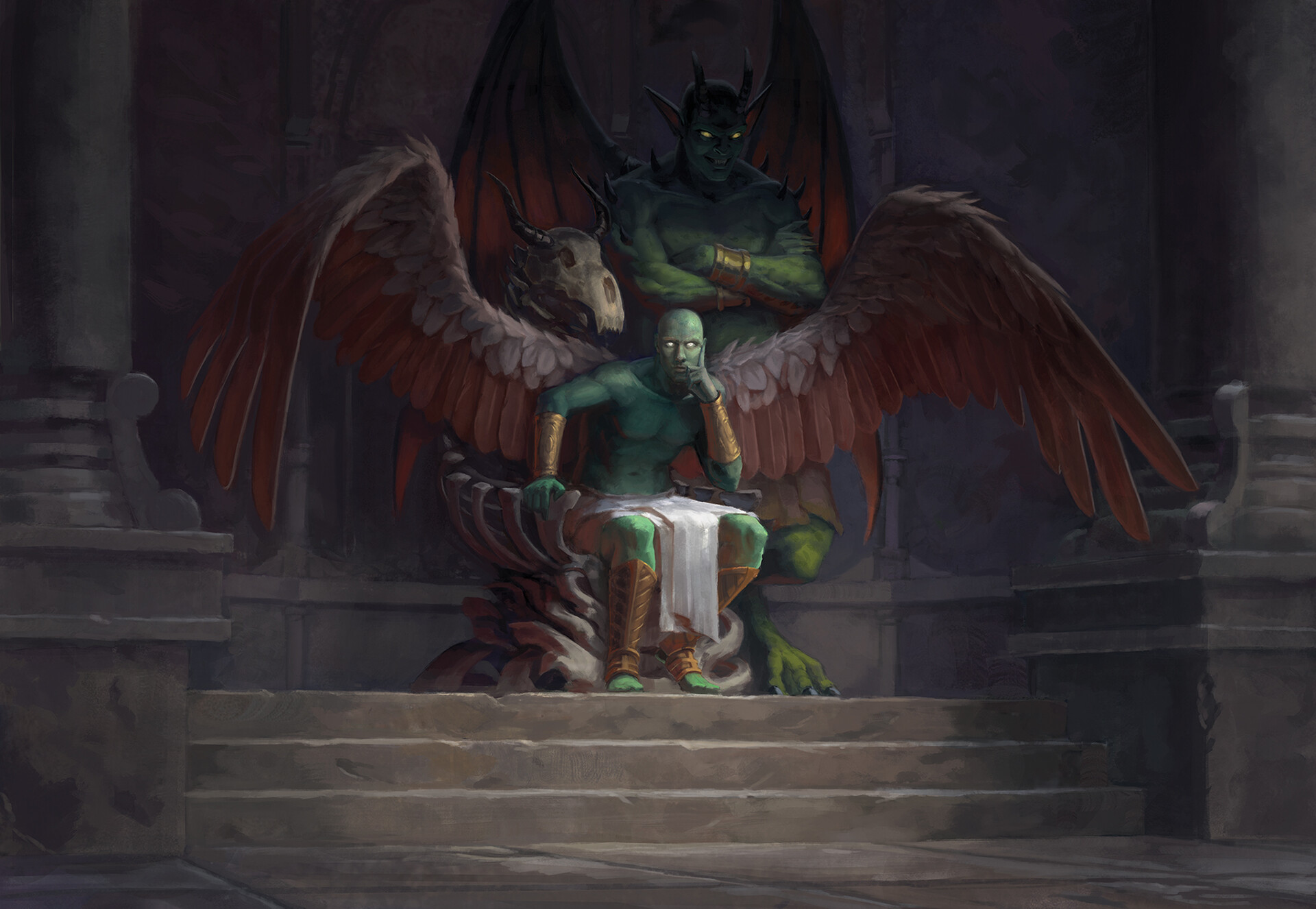

art by Sam Keiser
Angelic Weapons
As an extension of the gods, your divine power can be used to harm as well as heal. Starting at 6th level, any weapon attacks you make are considered magical. Once on each of your turns when you hit a creature with a weapon attack, you can cause the attack to deal an extra 1d8 damage to the target. The extra damage is necrotic or radiant; you choose the type of damage when you gain this feature.
At your DM's discretion, the damage type of this ability may change if you become a fallen angel (or if you are fallen or exiled but later redeem yourself).
Change Shape
Starting at 7th level, as an action during your turn, you magically polymorph into a humanoid or beast that has a challenge rating equal to or less than your angelic protector level divided by 3, rounded down, or back into your true form. You revert to your true form if you die. Any equipment you are wearing or carrying is absorbed or borne by the new form (your choice).
.
In a new form, you retain your alignment, current and maximum hit points, Hit Dice, ability to speak, proficiencies, and Intelligence, Wisdom, and Charisma scores, as well as this action. Your statistics and capabilities are otherwise replaced by those of the new form, except any class features or legendary actions of that form. You also do not gain the spellcasting feature or innate spellcasting feature for any form you take.
You may remain in a humanoid or beast form until you use this ability again. For humanoid forms with a base Challenge Rating of 2 or higher, this ability's duration is reduced to 10 minutes.
You may use this ability once per point of proficiency bonus, and recover any expended use upon completion of a long rest.
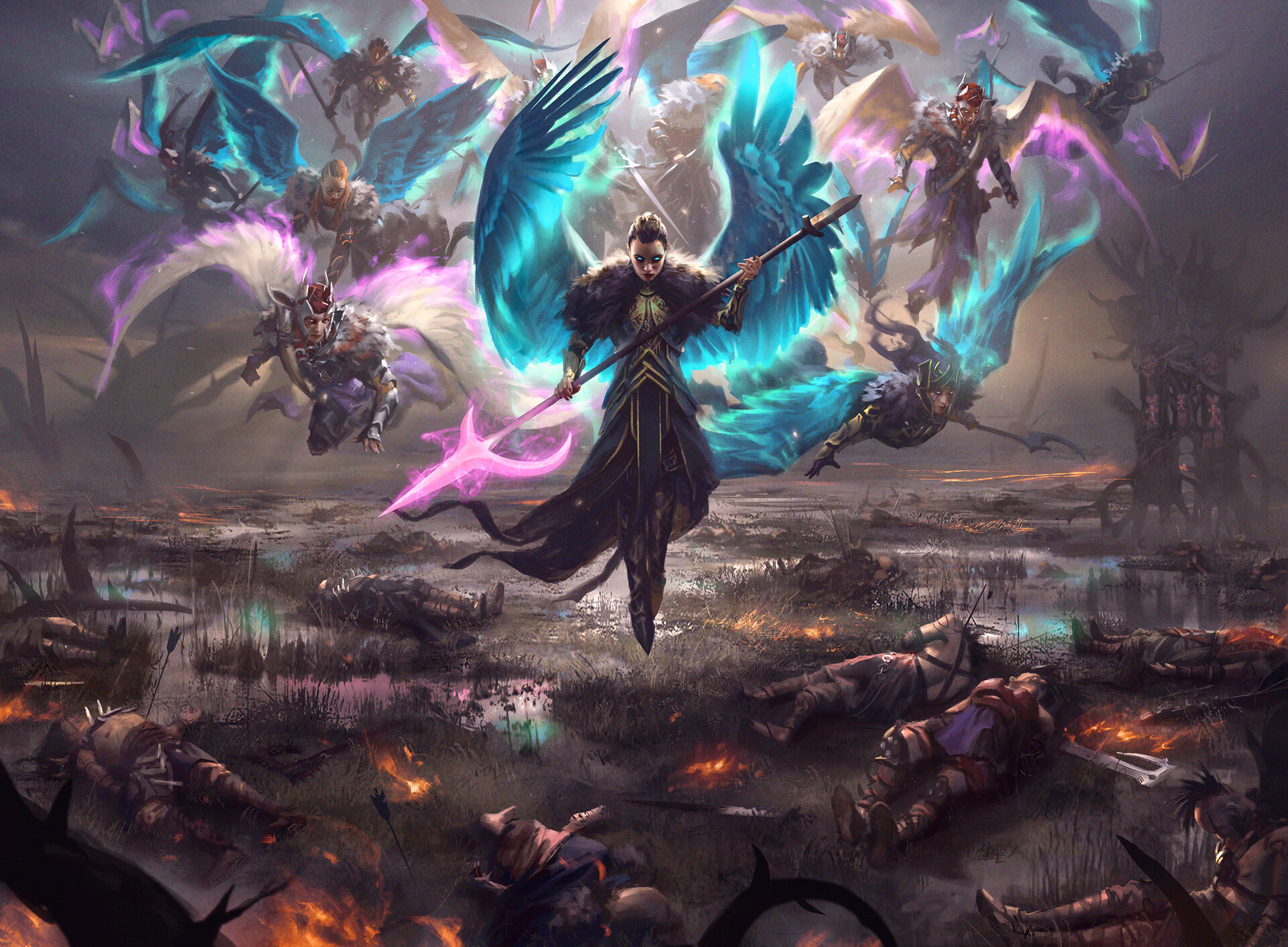

Size Increase (Large)
At 7th level, you have grown to the point that you are now considered a large-sized creature (or see page 16 for a variant rule if a large-sized character seems unwieldy). You now take up a 10-by-10 foot space. You can fit through spaces as though you were a Medium-sized creature without squeezing, but you can only fly at half speed through such narrow spaces. Your flying speed becomes 60 feet. You no longer fall to the ground at the end of your turn while flying, and can in fact remain flying for hours at a time.
Improved Innate Spellcasting
At 9th level, you learn the flame strike and raise dead spells. You may cast each of these spells once without any components, and without using a spell slot.
You recover any expended use of these spells upon completion of a long rest.
Living Panacea
You learn to tap into your celestial wellspring, granting you and your allies protection from attacks for a time. At 10th level, you can use this ability as a bonus action during your turn. You may choose any number of creatures within 30 feet. At the beginning of each of your turns, you and the chosen creatures each gain a number of temporary hit points equal to your Charisma modifier (minimum of 1).
In addition, whenever a chosen creature takes damage while they have temporary hit points, you may use a reaction to halve the damage taken by the creature. You take damage equal to the amount of damage taken by the target (after halving the damage). You may then use your Radiant Form ability as part of this reaction. The healing of your Radiant Form ability takes place immediately after you take the damage.
This ability lasts for 1 minute.
You may use this ability twice, and recover any expended use upon completion of a long rest.
Greater Angelic Weapons
Starting at 11th level, any weapon attacks you make have a +1 magical bonus to attack and damage rolls, unless the weapon you wield offers a larger bonus. In addition, you now add the bonus damage from your Angelic Weapons ability every time you hit with an attack.
Improved Natural Armor
At 13th level, your natural armor is now equal to 15 + your Constitution modifier. You may use a shield and still gain this benefit.
Supreme Healing Touch
Your ability to heal goes beyond mending wounds-- the divine presence within you can purge ailments as well. Starting at 14th level, using your healing touch ability on a target also frees them from any curse, disease, poison, blindness or deafness. If the target suffers from more than one ailment, then you remove a number of these debilitations up to your Charisma modifier (minimum of 1) each time you use your healing touch on them.
For the purposes of cursed magic items, this effect is identical to a remove curse spell cast on the creature and any cursed magic items affecting their person.
art by Billy Christian
Copyright Wizards of the Coast


Magic Resistance
At 15th level, you have advantage on saving throws against spells and other magical effects.
Greater Innate Spellcasting
At 17th level, you learn the blade barrier, control weather and insect plague spells. You may cast each of these spells once without any components, and without using a spell slot.
You recover any expended use of these spells upon completion of a long rest.
Walking Zone of Truth
Your ability to detect the motives of others (and the untruths lying behind their eyes) has become unparalleled. Starting at 18th level, as an action, you can force a creature within 30 feet of you to make a Charisma saving throw against your spellcasting save DC. On a failed save, the creature can't speak a deliberate lie whenever you are within line of sight. You know whether or not the creature succeeded or failed on their saving throw.
The creature is aware of this effect and can thus avoid answering questions to which it would normally respond with a lie. Such a creature can be evasive in its answers as long as it remains within the boundaries of the truth.
This ability lasts 10 minutes. You can use this feature a number of times equal to your Charisma modifier (a minimum of once). You regain any expended uses when you finish a long rest.
Divine Revelation
Over the course of time, you distinguish yourself even amongst the ranks of your immortal kind. Unlike other angels, you can share a small fraction of your divine power with those around you-- including your mortal allies.
art by G-host Lee
At 20th level, your Living Panacea ability now grants temporary hit points to each target equal to twice your Charisma modifier (instead of a number of points equal to your Charisma modifier). Whenever you use Living Panacea to share the damage taken by an ally, you gain resistance to any damage you take (unless you are already immune to the type of damage taken).
In addition, you gain truesight with a range of 60 feet.
Angelic Host
At 3rd level, a select few angels begin to rise beyond the rest, and in doing so, they gain new abilities to better represent their divine patrons. There are four angelic hosts: the Domain Avatar, the Nemesis, the Sword Seraph, and the Vanguardian, detailed below.
Domain Avatar
For celestials, there is no greater privilege than to carry the strength of the gods that created them. Angels literally exist to serve, and by harnessing a god's domain they can fulfill their grand design in ways otherwise impossible. While all angels carry fragments of divine power, domain avatars are seen as living embodiments of their god's might.
Aspect of The Gods
At 3rd level, you choose a cleric domain to make your own. You gain all of the abilities and granted spells of that domain as though you were a cleric two levels lower (at 3rd level, for example, you gain the cleric's first level domain spells and domain abilities).
As you gain levels in the angelic protector class, you also gain the higher level abilities and spells of your chosen domain, again as a cleric of two levels lower. In this way, you gain additional domain abilities at 4th level, 8th level, 10th level, and 19th level.
Whenever you learn new domain spells, you also gain two spell slots of the same spell level. The spell slots you gain in this way can only be used for casting your domain spells or any other spells of the same spell level gained by the angelic protector class. You do not require any non-costly components for any spells you cast with these spell slots.


Channel Oneself
At 4th level, you gain the Channel Divinity feature as though you were a cleric or paladin (described on page 5).
You gain the following two Channel Divinity options.
Innermost Warmth. As a bonus action, you emit bright light in a 10-foot radius, and dim light in a 10 foot radius beyond that. Magical darkness created by spells third level and lower is suppressed in this radius. In addition, while this ability is active, you and any allies within this light are immune to the extra damage caused by critical hits. This ability lasts 10 minutes.
Domain Manifestation. You may use a Channel Divinity ability granted to you by your domain.
At 8th level, you can use your Channel Divinity twice between rests.
Fill With Light
A tiny channel of the clearest water will cross in front of you, bisecting the path with its holy light as it trails down from the mountainside.
Have your fill of the divine waters, then leave an item of sentimental value before turning back. A battle-worn blade, or a ring passed down by generations are both suitable. Then do not return to this place-- your quest will have been satisfied.
Under no circumstance are you to follow the creek to its source-- for beyond the highest ridge lies a lakebed. There sits the Goddess of Winter's Melt-- and beside her radiance stand her heavenly host. It is a realm for immortal beings-- meaning any fool who ignores this advice will earn the gaze--and the wrath--of many feathered wings.
-Sir-Father Grizhenholt
.
art by Cmy Cai

Nemesis
All manner of angels exist, each with their own divine purpose. The nemesis, in particular, fulfills the role of the 'angel who walks amongst us.' Often in disguise, the nemesis acts as the scout, spy, or even assassin of the gods- performing the work that other angels might think unsavory. When pursuing a foe, they are unparalleled at drawing their target into single combat before striking them down.
Host Spells
You gain host spells at the angelic protector levels listed. In addition, whenever you learn host spells, you also gain two spell slots of the same spell level. The spell slots you gain in this way can only be used for casting your host spells or any other spells of the same spell level gained by the angelic protector class. You do not require any non-costly components for any spells you cast with these spell slots.
Host Spells
| Angelic Protector Level | Spells |
|---|---|
| 3rd | heroism, wrathful smite |
| 5th | branding smite, zone of truth |
| 7th | clairvoyance, bestow curse |
| 9th | banishment, locate creature |
| 11th | dispel evil and good, scrying |
Nemesis Stance
At 3rd level, you gain the ability to mark a foe as your quarry, bringing down your wrath upon them with a divine gaze. As a bonus action, choose one creature you can see within 30 feet of you. The target is considered marked for 1 minute. The mark ends early if the target dies, you die, or you are incapacitated. Until the mark ends, you gain the following benefits:
- So long as you are within 5 feet of the marked creature, they have disadvantage on all attacks against targets other than yourself.
- The first time you hit the marked creature with a weapon attack in a round, you deal an extra 1d8 damage to them. The damage is radiant or necrotic damage (your choice each time you hit).
You may use this ability once per point of proficiency bonus, and recover any expended use upon completion of a long rest.
At 11th level, you deal the extra damage from this ability every time you hit the marked creature with a weapon attack during the ability's duration.
Channel Divinity
Starting at 4th level, you gain one use of the Channel Divinity feature. You also gain the following Channel Divinity option.
Vengeful Flare. Whenever you are hit with a weapon attack by a creature within 60 feet of you that you can see, you may consume one use of your channel divinity as a reaction. The creature that damaged you must make a Wisdom saving throw against your innate spellcasting save DC. A creature takes 3d8 radiant or necrotic damage on a failed save (you choose the damage type when you use this ability). If your nemesis stance ability is active, your marked target gains disadvantage on the saving throw.
At 8th level, you can use your Channel Divinity twice between rests.
Tracker of the Gods
At 8th level, when you target a creature with your nemesis stance, you may choose to have your senses become preternaturally honed to their presence. You are immediately alerted whenever the chosen creature comes within 300 feet of you. You can only tell in general terms where they are, such as which cardinal direction they are relative to you, and whether or not they are above or below you. Your senses remain honed on that creature for ten days, or until you have targeted another creature with this ability, in which case any previous use expires immediately.
Slayer of the Gods
Starting at 8th level you may, as an action during your turn, teleport to an unoccupied space within 5 feet of the target of your nemesis stance ability (or the closest available space). You may use this ability so long as the marked creature is within 300 feet and visible to you. When you teleport using this ability, you become invisible to the marked creature for 1 minute as though you were under the effects of the greater invisibility spell, including the need to concentrate on that spell. This effect does not make you invisible to any other creatures.
You may use this ability once, and recover any expended use upon completion of a long rest.
Relentless
Those who delve into darkness learn to survive amongst the damned. At 10th level, whenever you would be reduced to 0 hit points but are not killed outright, you can drop to 1 hit point instead. If a marked creature was the source of the triggering damage, you immediately heal 4d10 hit points and recover from the charmed, frightened, and stunned conditions if you suffer from them.
You may use this ability once, and recover any expended use upon completion of a long rest.
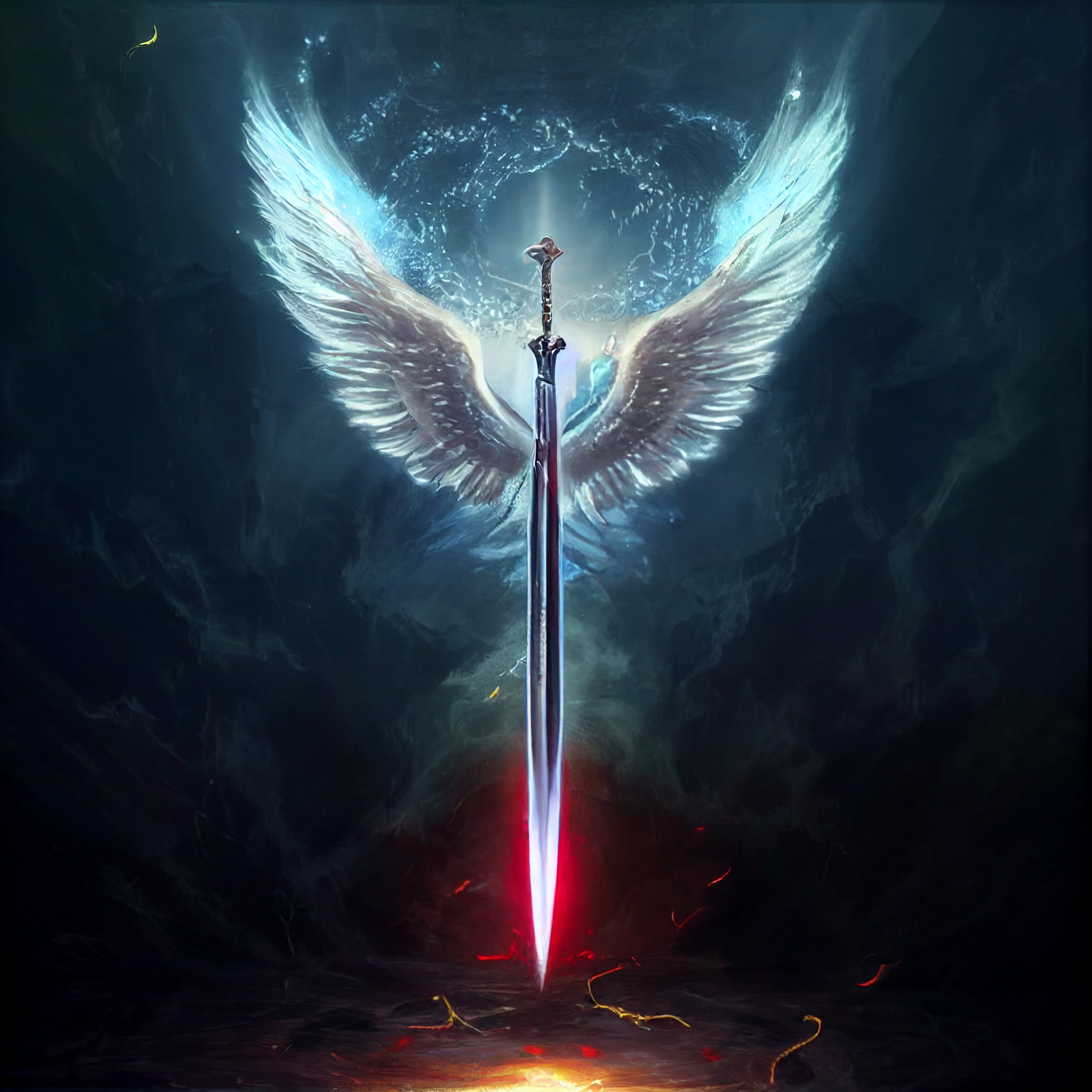

Tunnel Vision
You gain the ability to focus your enemy's thoughts such that the battlefield becomes a blur around you. Your foe's rage becomes so blind, and their awareness so narrow, that their only thoughts are of the conflict between you and them. The world could crumble around them, literally, and still they would fight on.
At 19th level, as an action during your turn, you may designate the target of your nemesis stance as your greatest foe. When you do so, the creature must make a Wisdom saving throw against your Innate Spellcasting save DC. On a failure, the creature becomes blinded to all but yourself, suffering the following effects:
- All other creatures become blurry and indistinct; the affected creature has disadvantage on all Perception checks to observe or notice anyone besides yourself.
- The affected creature can only use their action to make a single weapon attack against you. If the creature is unarmed, they attempt to strike you with whatever means they have available, either with their natural weapons or an unarmed strike.
- The affected creature can only use their move action to move closer to you. When using their move action, they must end the action at a distance no further from you than when they started the action.
- The affected creature takes 2d8 psychic damage at the start of each of their turns.
The affected creature may reroll the saving throw at the end of each of their turns, ending the effect on a success. If the affected creature is damaged by anyone other than yourself, they immediately gain an additional saving throw against this ability, ending it on a success.
This ability lasts for one minute. You may use this ability once, and recover any expended use upon completion of a long rest.
Sword Seraph
It is said that all serve the gods in their own subtle way, whether intentional or not. The gods of war, however, can be a bit more... direct in their intervention. Sword seraphs draw from the armories of these gods, summoning weapons as though from thin air and raining them upon their foes, all while protecting their allies from a similar fate. In some realms, a paladin or war-priest might call upon a seraph by name for aid.
Host Spells
You gain host spells at the angelic protector levels listed. In addition, whenever you learn host spells, you also gain two spell slots of the same spell level. The spell slots you gain in this way can only be used for casting your host spells or any other spells of the same spell level gained by the angelic protector class. You do not require any non-costly components for any spells you cast with these spell slots.
Host Spells
| Angelic Protector Level | Spells |
|---|---|
| 3rd | bless, guiding bolt |
| 5th | cloud of daggers, enhance ability |
| 7th | magic circle, slow |
| 9th | dimension door, leomund's secret chest |
| 11th | animate objects, bigby's hand |
From Beyond
Starting at 3rd level, you can pull a weapon from between the realms- taking it into your hands or hurtling it towards your foes. The weapon may appear through a small portal from Celestia or the Abyss, for example.
Choose a nonmagical weapon with which you are proficient. As an action, you summon a copy of the weapon above your head. The weapon hovers in place. Then, as part of the same action, the weapon can be taken in hand and used to make a single melee attack against a creature within the weapon's reach. If the weapon is one-handed, you can instead fling the weapon at a creature within 60 feet of you as part of the same action. This is treated as a thrown weapon attack for the purposes of attack and damage rolls (even if the weapon does not possess the thrown weapon property). The weapon deals damage as a standard weapon of its type.
The weapon is treated as though held by you for the purposes of your Angelic Weapons and Greater Angelic Weapons abilities. Any weapon you summon this way dissipates as soon as it hits or misses a target. If held in hand, it remains for as long as you retain your grip on it.
At 5th level, you may summon two weapons as a single action, which appear and attack one at a time. They may attack the same target or two different targets within range as you so choose.
art by Midjourney AI


Seraph's Sentinel
At 3rd level, you can summon an animated weapon to fight alongside you. As a bonus action during your turn, you can summon a magical weapon into your space. The weapon floats next to you but does not impede your movement. Then, as part of the bonus action used to summon it (or as a bonus action in future turns), you can have it move up to 30 feet to an unoccupied space, and can then make it attack a creature within 5 feet of it. Its attack bonus is equal to your proficiency bonus plus your Charisma modifier, and it deals damage equal to 1d8 + your Charisma modifier. The weapon deals magical bludgeoning, piercing or slashing damage (you choose each time you use this ability).
The weapon can appear to be any one handed melee weapon with which you are proficient.
You may unsummon your sentinel weapon as a bonus action. This ability otherwise lasts for 1 minute. You may use this ability twice, and recover any expended use upon completion of a long rest.
Channel Divinity
Starting at 4th level, you gain one use of the Channel Divinity feature. You also gain the following Channel Divinity option.
Battlefield Arbiter. Whenever you or a willing creature within 30 feet of you makes an attack roll, you can spend one use of your channel divinity to roll an additional d20. You can choose to spend your use of channel divinity after the die is rolled, but before the outcome is determined. You choose which of the d20s is used for the attack roll.
At 8th level, you can use your Channel Divinity twice between rests.
art by Greg Staples
Copyright Wizards of the Coast
Flurry of Blades
Summoning the means of war can be impressive in its own right, but a small army of spears and swords glinting in the air might be downright terrifying.
Starting at 8th level, as an action during your turn, you can summon dozens of nonmagical weapons above the battlefield. Then you choose a 20-foot cube within 120 feet of you that you can see, which is quickly rained upon by your floating arsenal. All creatures within this area must make a Dexterity saving throw against your innate spellcasting DC or suffer 4d8 damage and be restrained until the end of your next turn. Creatures who succeed on the save take half damage and are not restrained. The damage is slashing, piercing or bludgeoning damage- you choose each time you use this ability. The weapons disappear after impact.
You may use this ability twice, and recover any expended use upon completion of a long rest.
At 11th level, the weapons you summon in this way are considered magical.
Steel Phalanx
At 10th level, as an action during your turn, you can summon a multitude of weapons that hover about in a 25-foot cube centered on you. When you use this ability, you can designate up to five other creatures that you can see within this area. For the next minute, you and the chosen creatures each gain a magical, summoned weapon that floats in their space but does not harm them.
During this duration, whenever a protected creature is attacked, they may use their reaction to have their summoned weapon interpose itself between them and their attacker, causing the attack to have disadvantage. The creature may use this ability after the attack is rolled, but before the result is determined.
Creatures not protected by this ability that enter the area for the first time on a turn or start their turn there must make a Dexterity saving throw against your innate spellcasting DC. Those who fail their saves take damage equal to 2d8 + your Charisma modifier. This damage is magical bludgeoning, piercing, or slashing damage (you choose when you activate this ability).
You may use this ability once, and recover any expended use upon completion of a long rest.
Slaying Weapon
As a marshal of divine warfare, you carry the knowledge of the most potent and grave weapons available to the celestials. As you reach greater heights, you can call upon these divine armaments to strike your enemies down.
At 19th level, you can, as an action during your turn, summon a weapon of legend into the air above you. The weapon glows with radiant magic, and usually resembles a Large-sized greatsword, maul, or oversized arrow (or a normal-sized ballista bolt). The weapon floats for a moment before launching forward and striking an enemy.
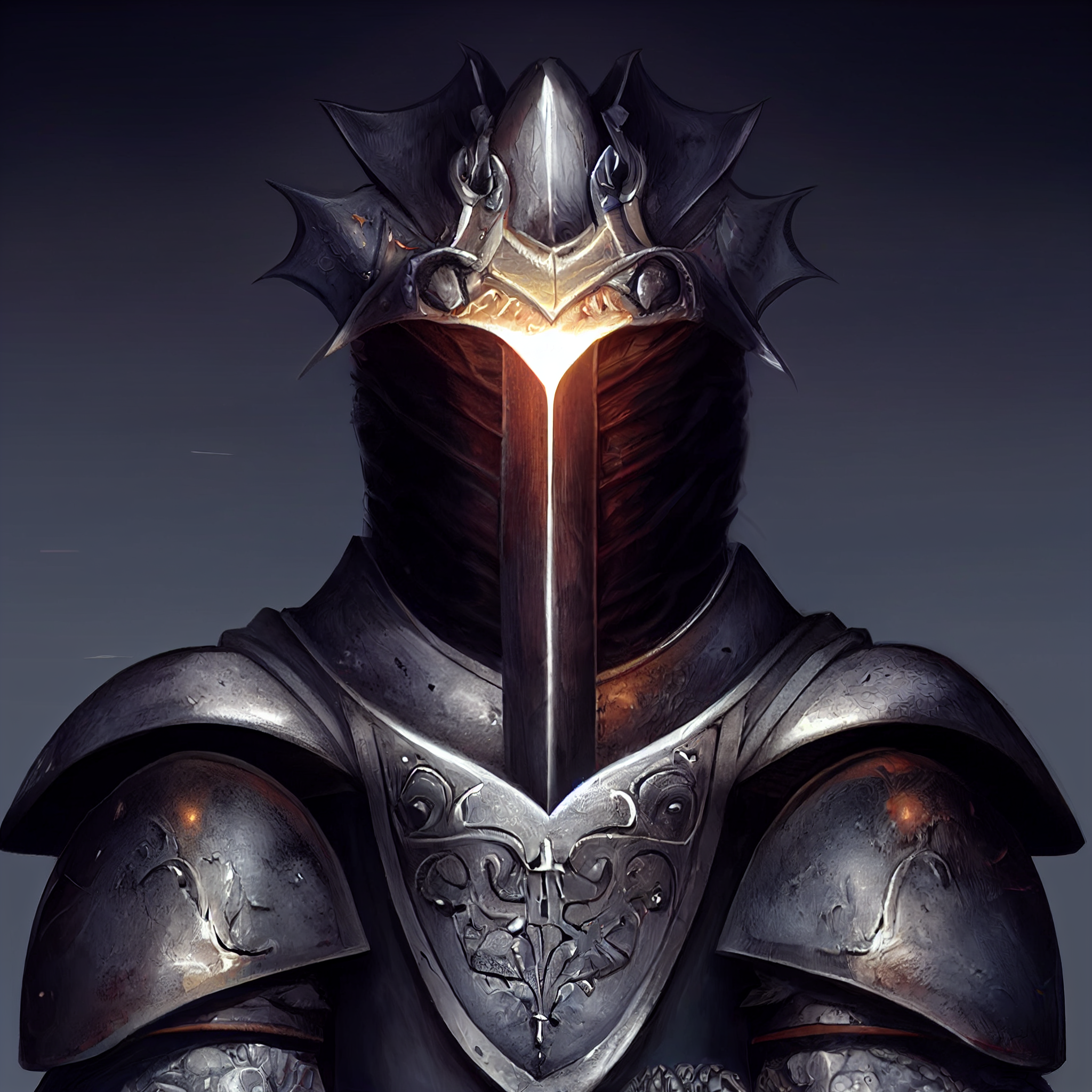

Make a ranged weapon attack against a creature within 120 feet of you that you can see. You may add your Strength or Dexterity modifier to the attack roll as you choose (as though using a finesse weapon). On a hit, a creature takes 2d8 magical bludgeoning, piercing or slashing damage (you choose when you use this ability) plus an additional 6d8 radiant damage. If the target is a creature that has 100 hit points or fewer, it must then succeed on a DC 20 Constitution saving throw. On a failure, the creature immediately dies.
You may use this ability once, and recover any expended use upon completion of a long rest.
Vanguardian
Virtually all angels are more than capable of defending themselves, but some focus their energies on protecting others more so than on smiting their foes. These divine bastions tend to wear their enemies down through attrition, all while standing firm in the face of withering assaults. In addition, these guardian angels have bolstered healing abilities, making them invaluable in any conflict.
Host Spells
You gain host spells at the angelic protector levels listed. In addition, whenever you learn host spells, you also gain two spell slots of the same spell level. The spell slots you gain in this way can only be used for casting your host spells or any other spells of the same spell level gained by the angelic protector class. You do not require any non-costly components for any spells you cast with these spell slots.
Host Spells
| Angelic Protector Level | Spells |
|---|---|
| 3rd | command, shield of faith |
| 5th | prayer of healing, warding bond |
| 7th | beacon of hope, spirit guardians |
| 9th | death ward, guardian of faith |
| 11th | hallow, mass cure wounds |
Frontline Training
At 3rd level, you gain proficiency with heavy armor.
Guardian Angel
Starting at 3rd level, you heal an additional 1d8 hit points when using your healing touch ability on a creature at less than half of their maximum hit points.
.
art by Midjourney AI
Channel Divinity
Starting at 4th level, you gain one use of the Channel Divinity feature. You also gain the following Channel Divinity option.
Premonition. Whenever a creature within 30 feet of you that you can see is hit by an attack, you may spend one use of your channel divinity to give that creature resistance to one damage type against that attack. If the creature already has resistance against that damage type, they instead become immune to that damage type against that attack.
At 8th level, you can use your Channel Divinity twice between rests.


Angelic Commander
Starting at 8th level, when you use your healing touch ability and target another creature, roll the healing dice normally. You regain a number of hit points equal to half of the hit points recovered by the target.
In addition, you may choose to use your healing touch ability as a bonus action, but may only target yourself when doing so.
Searing Radiance
You draw upon your inner light, creating a pulse that heals allies yet burns away the unworthy. Starting at 10th level, as an action during your turn, you blast a 20 foot radius sphere centered on yourself with radiant energy. Allies in this radius that you can see (including yourself) magically heal 6d4 hit points.
Enemies that you can see within this radius must make a Constitution saving throw, taking 6d6 radiant damage on a failed save, or half damage on a successful save.
You may use this ability twice, and recover any expended use upon completion of a long rest.
Living Ambrosia
At 19th level, whenever you use your living panacea ability, you may choose up to one creature within the ability's radius. During the ability's duration, you and the chosen creature each regain a number of hit points equal to your Charisma modifier at the start of each of your turns.
art by Chengwei Pan
Copyright Riot Games

Angel Cohorts- Miscellany
Challenge Rating for Angels
The following challenge ratings are based on the Monster Statistics by Challenge Rating table on page 274 of the Dungeon Master's Guide. Note that the below numbers were calculated without accounting for equipped magic items.
As a point of reference: The average level 20 player character may have a CR around 12-14 depending on the character's build and magic items, and can become higher still when using an optimized build and powerful items.
| Cohort Level | Recommended CR |
|---|---|
| 1 | 1/2 |
| 2 | 1/2 |
| 3 | 1 |
| 4 | 2 |
| 5 | 3 |
| 6 | 3 |
| 7 | 3 |
| 8 | 4 |
| 9 | 5 |
| 10 | 5 |
| 11 | 6 |
| 12 | 6 |
| 13 | 7 |
| 14 | 7 |
| 15 | 7 |
| 16 | 8 |
| 17 | 9 |
| 18 | 10 |
| 19 | 11 |
| 20 | 11 |
Roleplaying as an Angel
Angels have a reputation for instilling order and justice in the multiverse. As beings created for this purpose, angels are known for their sound judgment as well as their unwavering faith in the gods that empower them. When roleplaying as an angel, it is best to remember that where mortals may be corrupted by evil or destitution, angels are expected to be above such things.
Some angels think of mortals as weak or lesser beings, like children that must be led by a responsible shepherd. Other angels define mortals not by their vices, however, but by their drive and potential. An angel's opinion of mortals likely shapes their behaviour, too. Consider that not every angel is a stern teacher. Some angels prefer to win over their humanoid allies through charm and kindness instead.
Regardless of how they behave around mortals, angels are almost always straightforward in stating their motives, and for angels in good standing at least... it is highly unusual for subtlety or deception to be a part of their dealings. Fallen angels are the obvious exception.
While angels are known as a force of "good", one could make the argument that it is law, not goodness, that binds all angels. Note that fallen angels often retain their rigid view of the multiverse, even as they fall to corruption or downright hatred. Evil and exiled angels, however, redefine what they consider their "allies" and "enemies", and it is not unusual for a fallen angel to continue their quest for justice... but with a different set of foes in mind. Instead of pursuing evil, a fallen angel may instead think of excess, ignorance, or mortality itself to be a sin worth purging.
Keep in mind that, in all but the most egregious examples, angels rarely acknowledge when they are wrong. This makes fallen angels remarkably difficult to deter from their twisted purpose.
One Rises, Another Falls
What causes an angel to fall, and how can they redeem themselves if they choose to do so? The answer to these questions can be hard to come by. Every god represents a unique portfolio of divine areas-- such as storms, death, light, life, and so on. Each of these gods may have angels with unique traits, values, and a different line that they should not cross.
The god of storms and seas might disagree with the god of war on many things-- but both dieties might agree that sometimes sacrifices must be made so that society may live. The god of life and fertility, however, may think that any death is a tragedy to be avoided. The god of death, though, sees the end of life as inevitable, and running from death would be a fool's errand at best.
When an angel deviates from it's god's philosophy, that does not necessarily mean that the angel falls to evil. It may be that an angel strays too far from the path to be considered "pure" and may be exiled for that alone. As such, it is important to remember that there are exiled angels that are still good, but act in a way atypical for followers of a given god. An angel of the god of life may begin to see some lives as more valuable than others. An angel of destruction may go far out of their way to avoid death "before its time", namely in youths or innocent peoples.
No matter how they fall or stray from the path, though, redeeming oneself in a god's eyes almost always means recommitting to their philosophy. When an angel spends enough time around other ideas or ways of life (like living amongst mortals), sometimes returning to that path becomes less attractive than one would think... redemption may come at its own price.


.
art by Dan Robinett
Variant Rule- Alternative to Large Size
By default, the angelic protector becomes a large-sized creature at 7th level. If the idea of a 10-by-10 foot character does not appeal to you, one can substitute the below ability instead, which replaces the 7th level "Size Increase (Large)" feature in its entirety:
Beyond Mortal
At 7th level, your divine power brings insurmountable feats of strength within your reach. You now count as one size larger when determining your carrying capacity and the weight you can push, drag, or lift. This does not stack with the Powerful Build trait. You also gain advantage on saving throws to resist being knocked prone.
In addition, your flying speed becomes 60 feet. You no longer fall to the ground at the end of your turn while flying, and can in fact remain flying for hours at a time.
.
Credits
Cover Art by Demizu Posuka (www.instagram.com/demizuposuka/?hl=en) Page 2 Art by Soft-h (https://www.deviantart.com/soft-h/gallery) Page 4 Art by Hongqi Zhang (https://www.artstation.com/hongqizh1437) Page 5 Art by Algenpfleger (https://www.deviantart.com/algenpfleger) Page 6 Art by Sam Keiser (https://www.artstation.com/samkeiser) Page 7 Art by Billy Christian (https://www.artstation.com/billcreative) Page 8 Art by G-host Lee (https://www.artstation.com/g-host-lee) Page 9 Art by Cmy Cai (https://www.artstation.com/cmy) Pages 11, 13 Art by Midjourney AI (generated by Mister_Thr33) (https://www.midjourney.com/home/) Page 12 Art by Greg Staples (https://www.gregstaples.com/) Page 14 Art by Chengwei Pan (https://www.artstation.com/pan) Page 16 Art by Dan Robinett (https://www.artstation.com/danrobinett) Back Cover Art by Yutthaphong Kaewsuk (https://www.artstation.com/kamiyama) Watercolor stains by Jared Ondricek (https://watercolors.giantsoup.com/xgte/xgtebottom-left/index.html)
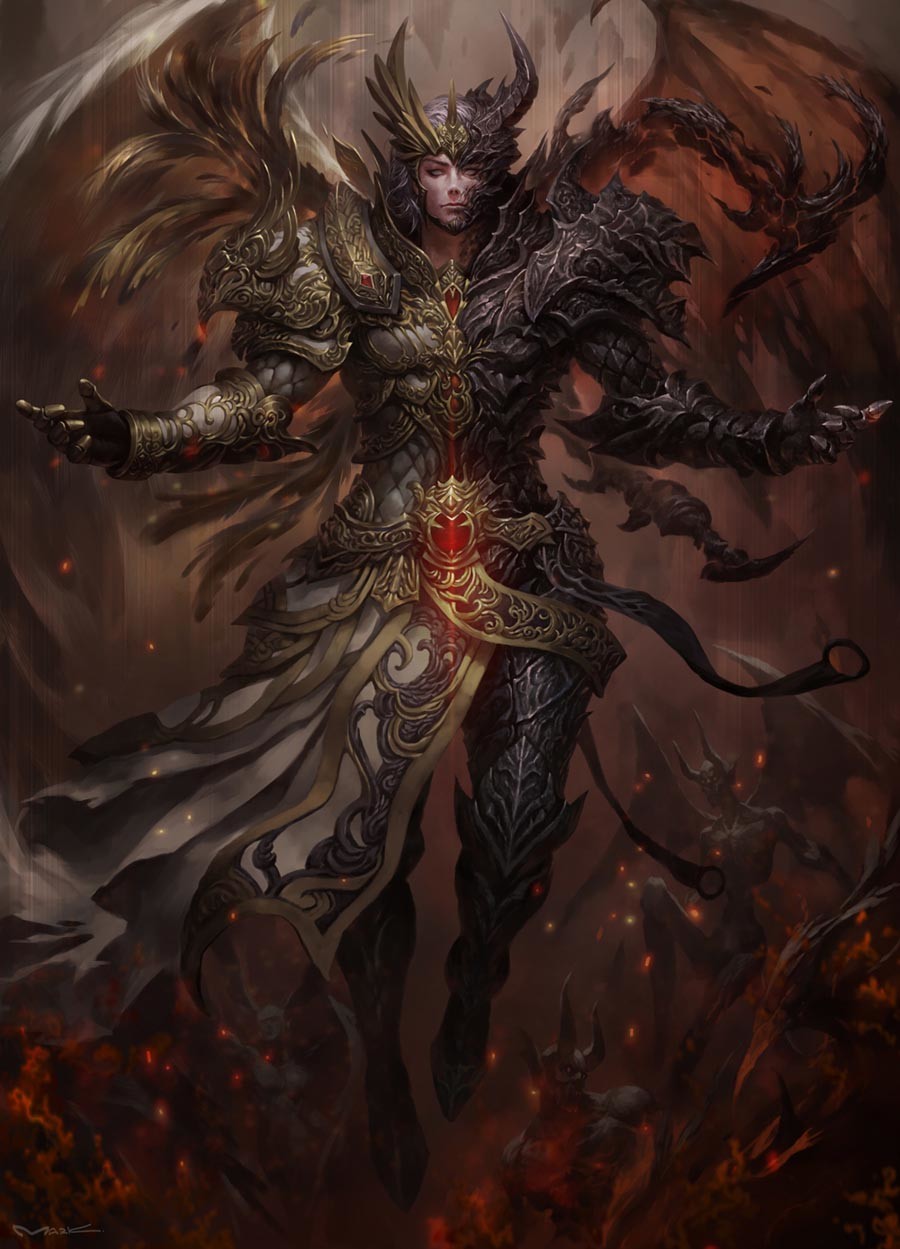

May Your
Sidekick
Never Fall
Creature Cohorts were created by me, Mister_Thr33, and were inspired by Tasha's Cauldron of Everything as well as the 3rd Edition supplement Savage Species
'Creature Cohorts' is unofficial Fan Content permitted under the Fan Content Policy. Not approved/endorsed by Wizards. Portions of the materials used are property of Wizards of the Coast. ©Wizards of the Coast LLC.
Special thanks to the r/unearthedarcana and r/dndhomebrew subreddits for their input and inspiration
No mortals strayed from the light during the creation of this document
Thank you all for your support!